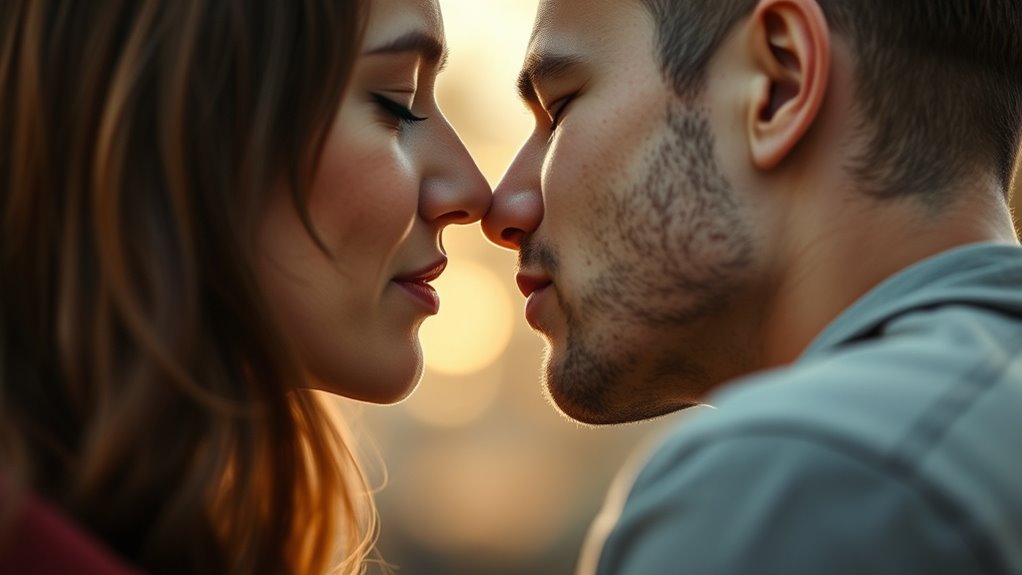Closing your eyes when you kiss deepens emotional intimacy and heightens your senses by shifting focus away from visual cues. This act signals trust, openness, and vulnerability, making the moment more meaningful. It also enhances awareness of textures, warmth, and breathing, strengthening connection. By reducing external distractions, you become more present, understanding subtle cues from your partner. If you’re curious about how this simple gesture transforms your experience, there’s more to discover just ahead.
Key Takeaways
- Closing eyes during a kiss enhances emotional intimacy by shifting focus from visuals to sensations.
- It creates sensory deprivation, heightening tactile awareness and making the moment more immersive.
- The act fosters vulnerability, trust, and openness, deepening emotional bonds between partners.
- Removing visual input reduces external distractions, allowing for better recognition of subtle emotional cues.
- It transforms a simple gesture into a meaningful, trust-building experience through psychological and physiological benefits.

Have you ever wondered why we instinctively close our eyes when kissing? It’s a common gesture, yet its reasons go deeper than mere habit. When you close your eyes during a kiss, you’re engaging in a subtle yet powerful act that enhances emotional intimacy. By shutting out visual stimuli, you allow yourself to focus more fully on the sensations and feelings that the moment evokes. Instead of being distracted by the sights around you, your attention shifts inward, fostering a sense of closeness and vulnerability. This act of closing your eyes helps deepen your emotional connection, making the experience more personal and meaningful. It signals trust and openness, letting your partner know that you’re truly present in the moment.
Closing your eyes during a kiss deepens intimacy and focuses your senses on the moment.
At the same time, closing your eyes creates a form of sensory deprivation. When your visual input is cut off, your other senses become heightened. You become more attuned to the subtle textures of your partner’s lips, the warmth of their skin, the gentle rhythm of their breathing. This heightened sensory awareness makes the kiss feel more intense and immersive. With your eyes shut, you’re less likely to be distracted by external stimuli, allowing you to fully experience the intimacy that the act of kissing offers. This sensory focus amplifies the emotional power of the moment, making the connection feel more profound. Research indicates that color accuracy and visual cues significantly influence how we perceive and interpret emotional signals, which is why shutting the eyes during a kiss helps us focus on tactile and emotional sensations.
Closing your eyes during a kiss isn’t just about hiding your nervousness or shyness; it’s a conscious way to deepen emotional intimacy. When you’re not relying on visuals, you’re more receptive to your partner’s subtle cues—the way their lips move, the slight tension in their jaw, their breath. These cues help you understand their feelings and intentions more clearly, strengthening the emotional bond. Plus, this act of sensory deprivation reduces external noise and distractions, helping you stay present. You’re not thinking about anything else but the sensation and emotion of the moment.
In essence, closing your eyes during a kiss is a deliberate act that fosters emotional intimacy and heightens your sensory experience. It transforms a simple act into a moment of vulnerability, trust, and connection. By doing so, you create a space where feelings can flourish without the interference of the outside world. That small gesture, closing your eyes, unlocks a deeper level of intimacy and makes the experience of kissing much more meaningful—something that words alone can’t fully express.
Frequently Asked Questions
Does Closing Eyes During a Kiss Vary Across Different Cultures?
You might wonder if closing your eyes during a kiss varies across cultures. In some cultures, it’s common to close your eyes as part of kissing rituals, while others see it as unnecessary or even unusual. Cultural norms influence these behaviors profoundly, shaping how people approach intimacy. So, yes, the way people close their eyes during a kiss can differ widely, reflecting diverse cultural attitudes toward affection and closeness.
How Does Eye Closure Influence the Perceived Intimacy of a Kiss?
Imagine you’re about to kiss someone and close your eyes, creating sensory deprivation. This act heightens emotional vulnerability, making the moment feel more intimate. Research shows that closing your eyes during a kiss can increase perceived intimacy because it allows you to focus on touch and connection, rather than visual distractions. By removing sight, you deepen emotional bonds, making the experience feel more genuine and meaningful for both of you.
Are There Differences in Eye-Closing Habits Between Genders?
You might notice gender differences in eye-closing habits during a kiss, as men and women often express emotions differently. Women tend to close their eyes more frequently, showing openness and emotional expression, while men may keep their eyes open longer, perhaps indicating control or confidence. These habits reflect broader patterns of emotional expression, highlighting how gender influences nonverbal cues in intimate moments.
Can Closing Eyes During a Kiss Affect Emotional Bonding?
Closing your eyes during a kiss is like shutting a window to a view; it enhances emotional regulation by reducing sensory input. This sensory deprivation helps you focus on your partner’s touch and scent, deepening emotional bonds. When you close your eyes, you create a safe space for vulnerability, making the experience more intimate. So, yes, closing your eyes can strengthen emotional connection by allowing you to truly feel without distractions.
What Neurological Processes Are Involved When We Close Our Eyes to Kiss?
When you close your eyes to kiss, your brain activates specific neural pathways that enhance intimacy. This process involves neurotransmitter release, like oxytocin, which fosters bonding and trust. By shutting out visual stimuli, your brain focuses on tactile and emotional cues, strengthening your connection. This neurological process makes the experience more intimate, allowing you to fully engage with your partner without distractions, deepening your emotional bond.
Conclusion
So, next time you kiss and close your eyes, remember you’re not just shutting out the world—you’re opening your heart’s window to intimacy. It’s as if your senses trade the visual for a deeper connection, like tuning into a secret melody only your soul can hear. Closing your eyes transforms the kiss into a dance of trust and vulnerability, turning a simple moment into a tender symphony of emotion. Embrace it; it’s your heart’s silent whisper.










